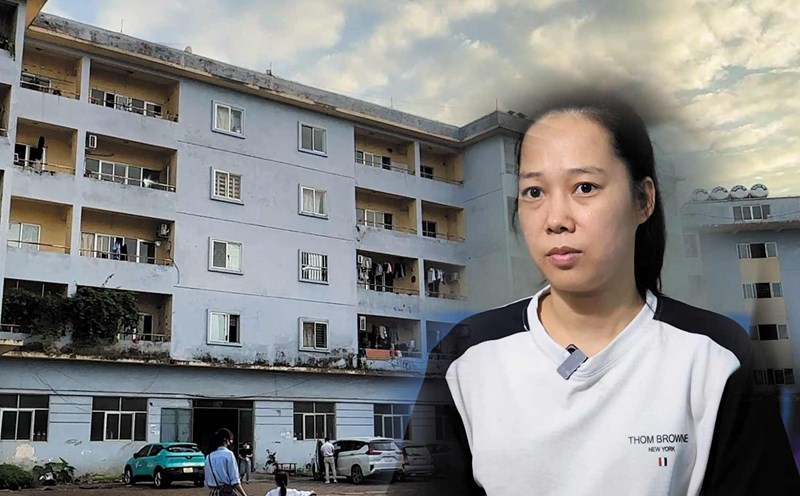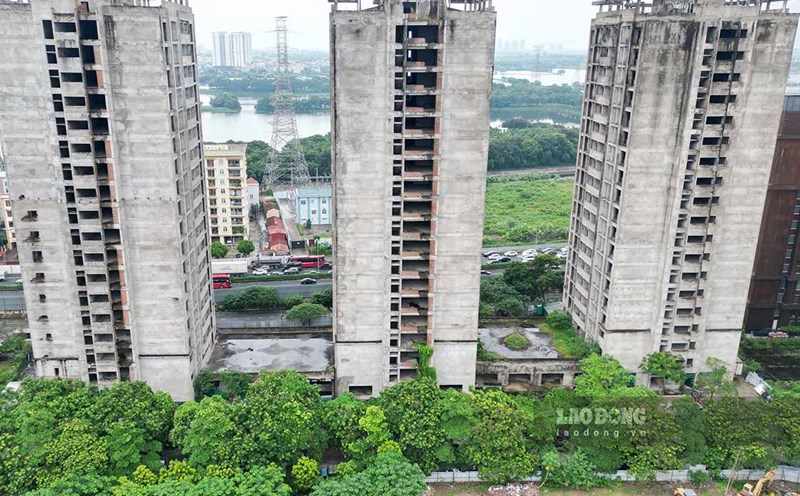To reach the goal of 1 million social housing units, experts say new thinking is needed to solve the supply problem.
Businesses complain that "the most annoying thing is the procedures"
From 2021 to now, Ho Chi Minh City has put into use 6 projects with a scale of 2,700 apartments and is under construction of 4 projects with 3,000 apartments. According to the plan from now until April 30, 2025, the city will focus on removing obstacles and completing procedures to start construction of 5-6 more social housing projects (NOXH) with a scale of about 6,000 apartments.
In a workshop on social housing implementation, Ms. Dang Thi Kim Oanh - Chairwoman of the Board of Directors of Kim Oanh Group - said that Kim Oanh Group is planning to develop 26 social housing projects with a total of 40,000 apartments, a total land fund area of 107 hectares and is preparing to launch the first social housing project in Binh Duong New City, Binh Duong Province with a scale of 26.69 hectares.
According to the leader of Kim Oanh Group, issues related to land funds are still a major obstacle for businesses when investing in social housing. According to regulations, commercial housing projects must set aside 20% of their land funds to build social housing. However, the allocation of this land fund to businesses or localities is still unclear, and there needs to be transparency in land valuation between land funds allocated by the State and land funds purchased by businesses themselves.
Citing the Kim Oanh Group project in Binh Duong, Ms. Oanh said that the origin of this land is industrial park land approved to be separated into a residential area and has been approved for a 1/500 planning. Based on the industrial park land price of 170 USD/m2, the value of the project land is about more than 1,000 billion VND, but if applying the current price of land for commercial housing, it will be up to more than 3,000 billion VND, an increase of about 3 times. This is a huge barrier to the development of social housing projects.
Another issue that Kim Oanh Group’s leaders pointed out is legal procedures. Although there are separate regulations for social housing, in reality, administrative procedures have not been shortened, leading to a longer project completion time, which affects the investment efficiency of enterprises.
Regarding profit, according to current regulations, businesses are entitled to a maximum profit of 10% and the allowed social housing selling cost is 2%, for a total of 12%. However, in reality, this cost is up to more than 6%, so the profit is only 6%.
Regarding the exchange of land funds for social housing construction, although the new law stipulates that investors are allowed to propose exchanges, the condition is that they must have land funds in the same type of urban area or the same company, which is very difficult to meet because not all investors have many land funds in the same type of urban area.
Mr. Le Huu Nghia - Director of Le Thanh Company, a business specializing in developing social housing in Ho Chi Minh City - said that recently, the Le Thanh Tan Kien social housing project (phase 1) in Binh Chanh district, invested by his company, has officially started construction after many years of inactivity due to planning problems.
This is also the only social housing project in Ho Chi Minh City that will start construction in 2024 with an area of 23,100.8 square meters and a scale of 1,456 social housing units for rent. However, the company will need about 5 years to complete the legal procedures alone. In addition, this company also has another social housing project, the Le Thanh Tan Tao 2 project in Binh Tan district, which is waiting for legal clearance to start construction in the expected time of more than 4 months.

Need to change thinking
Mr. Le Hoang Chau - Chairman of the Ho Chi Minh City Real Estate Association (HoREA) - proposed that social housing projects should be allowed to adjust the land use coefficient or construction density up to a maximum of 1.5 times, in order to effectively utilize land area and create more apartments.
HoREA emphasized that compensation and site clearance costs will be allocated less to each apartment, thereby reducing the cost of social housing. At the same time, HoREA proposed to add to Decree 100 a regulation recognizing individual houses as long-term rental houses, which is also a form of social housing invested and operated by individuals and households, so that landlords will be treated similarly to social housing project investors. From there, landlords will also enjoy preferential credit policies and a tax reduction of 3.5%/revenue (including 2.5% value added tax and 1% personal income tax).
HoREA also proposed that the National Assembly consider amending and supplementing the Law on Value Added Tax and the Law on Corporate Income Tax to stipulate preferential tax policies for investors of social housing projects for lease only, in the direction of reducing 70% of the value added tax rate to 3% and reducing 70% of the corporate income tax rate to 6% to encourage enterprises to invest in developing social housing for lease.
Sharing with Lao Dong reporter about the project of 1 million social housing units, Mr. Vuong Duy Dung - Deputy Director of the Department of Housing and Real Estate Market Management (Ministry of Construction) - informed that nationwide, there are 619 social housing projects that have been implemented, with a scale of 561,816 units. Of which, 79 projects have been completed, with a scale of 40,679 units; 128 projects have started construction, with a scale of 111,688 units; 412 projects have been approved in principle, with a scale of 409,449 units. The number of apartments that have been started and completed to date has reached about 35.6% of the target set for 2025 of 428,000 units.
According to the Ministry of Construction, the mechanisms, policies and preferential credit sources for investors in social housing projects are still not attractive enough. The source of construction investment capital from the budget is still limited. The procedures for buying, renting and leasing social housing are still complicated, especially the confirmation of documents proving housing conditions, income and residence. Phan Tuan











